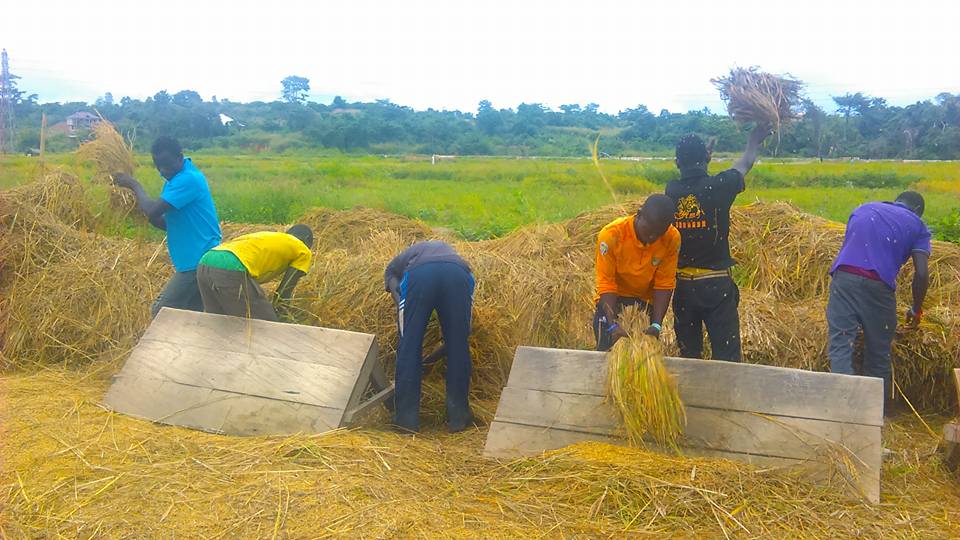
Issah Sawadougo and his first wife
Issah Sawadougo has grown cocoa for the last 19 years, but luckily the 47-year-old does not have a sweet tooth.
“I grow cocoa to provide for my family for the past 19 years. I have two wives, six children,” said Sawadougo, walking around his farm in a farm village, around 15 km (18.6 miles) west of the Dormaa Central capital, Dormaa Ahenkro.
Apart from his six Children, Sawaduogo caters for 32 other children from his siblings and other relatives. These family members see him as a wealthy farmer and burden him with many responsibilities. He employs 80 people on the 150-acre cocoa farm.
Mr. Sawadougo is an immigrant from Burkina Faso who came to Dormaa as a settler farm labourer. He says he started cocoa farming with a land tenure system called “do ma yen kye “, in Akan. In this system, the landowner leases the land out to the farmer the profit is shared according to formula.
Cocoa production is a key source of income for many smallholder farmers in Ghana, who plant on average 1 to 3 hectares (2.5 to 7.4 acres).
But their production has slumped over the years as a result of poor yields blamed on the extreme weather, weak global prices and low-quality cocoa.
A 2011 study by the International Center for Tropical Agriculture (CIAT) predicted cocoa farming will

Under the pilot artificial pollinating project, COCOBOD hired people to pollinate cocoa trees
be hit as climate change alters growing conditions, leading to a fall in production by 2030.
But the researchers also said rising temperatures offer an opportunity to boost production if farmers adapt their practices. It recommended better shading for cocoa trees and the use of improved varieties.
Cocoa farmers in Ghana are now trying to turn the tide by planting varieties that are harder and faster-maturing than those grown since cocoa was introduced to Africa centuries ago.
In the last five years, Sawadougo has harvested up to 2000 bags of cocoa beans annually. But this year he is expecting as much as 3000 bags.
“Over the years bad weather has affected the crop,” he said. “It has made a big difference for me,” he said.
Sawadougo says one of the reasons why production is declining is depletion of soil fertility. He continues that, extreme weather conditions make the soil lose moisture and other important components that make it rich such as micro-organisms.
Many farmers including Sawadougo are aware of climate change. They apply indigenous knowledge and history to detect changes in climatic conditions.
Soil fertility is declining in many parts of sub-Saharan Africa. Climate change is expected to bring more extreme weather events such as flooding, drought, and more unpredictable weather. These changes will likely only deepen problems with soil fertility.
Soil fertility is declining for a variety of reasons. Some common farming practices, including burning crop residues and leaving soil bare and unprotected from the sun and wind, are part of the problem. Excessive or insufficient use of fertilizers and improper crop rotations also lead to declining soil fertility.

Issah Sawadougo showing one of the tendering a recently planted seedling
The impact of climate change on soils is a slow complex process as because soils not only be strongly affected by climate change directly (for example effect of temperature on soil organic matter decomposition and indirectly, for example, changes in soil moisture via changes in plant-related transpiration but also can act as a source of greenhouse gases and thus contribute to the gases responsible for climate change.
In addition changes in the functions and uses soils may be driven more by socio-economic factors than environmental ones.
However, the interaction of the various soil-forming processes, particularly biological ones, makes difficult to quantify the changes.
But there are many traditional and modern practices which can help boost soil fertility, and assist farmers in making their farms more resilient and resistant to the changing climate. These include micro-dosing of fertilizer, using rather than burning crop residues and other organic matter, planting nitrogen-fixing crops and trees, making good use of compost and manure, and taking steps to prevent wind and water erosion.
MITIGATING THE EFFECTS OF CLIMATE CHANGE

David Afriye Gyebi, District Cocoa Officer of the Cocoa Health and Extension Division
To mitigate the effect of climate change, Sawadougo says he and many other farmers in the Brong Ahafo have adopted planting trees in their cocoa farms. This, he says will replenish the forest cover that provides moisture to the land. The Forestry Commission of Ghana is, therefore, providing seedlings to farmers for planting in their cocoa farms under the Forest Improvement Programme.
David Afriye Gyebi, District Cocoa Officer of the Cocoa Health and Extension Division (CHED) of the COCOBOD says, COCOBOD is pushing for a sustainable cocoa industry that can increase the productivity of smallholder farmers.
The council is also running a pilot project to artificially pollinate cocoa trees in order to increase yield per tree.
Sawadougo may be no chocolate connoisseur but he plays his small part in feeding a global indulgence estimated to be worth nearly $99 billion this year.
“Cocoa needs to be tendered like a baby until it flowers and matures – after that, you never go for a day without getting something from your cocoa tree,” said the farmer.
*Gideon Kwame Sarkodie is an Award winning Agriculture Journalist, Broadcaster Trainer with Farm Radio International based in Kintampo.




